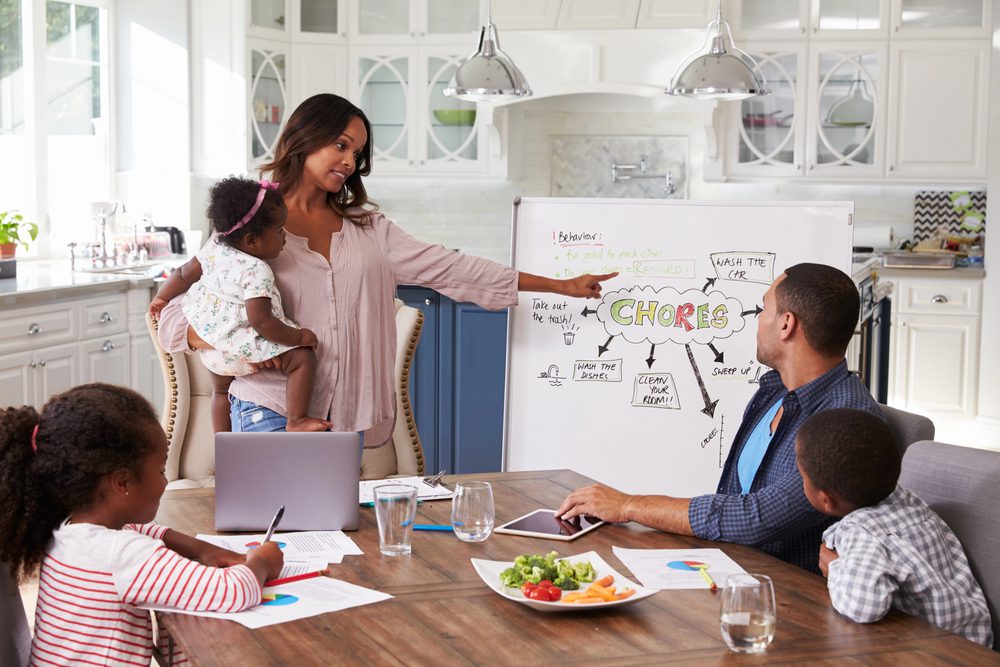Building Family Relationships, Discipline & Challenging Behaviour, Essential Kids Blog, Family Breakdown & Sibling Rivalry, Posts for Parents, Press & Online
Family meetings

Technically a family operates like a small organisation, like a community or even a small business.
Everyone knows that, within work culture, having a clear vision or mission statement is pretty important and can even be deceptively powerful at guiding not only the intended goals and aims of the organisation, but in shaping the culture.
In a family, having a clear vision is a bit like having a map to navigate the journey of life and it can create a sense of structure and predictability for children.
Early in the year is a fabulous time to have a family meeting to chat about family values, direction and to sort out (and remind everyone) of key important roles everyone needs to play to help the family team work best.
These days, families are dining together less and so many of these things that used to happen naturally over the dinner table are simply not happening.
Family meetings can be really helpful for younger kids as well – as they get to see adult communication and most importantly have the opportunity to be heard.
Even though it gives everyone a chance to be heard, parents still need to remain the ‘alpha’ voices in the family and a family meeting helps parent choices be explained or considered in a sensible, calm way.
Plus, a key aspect of the family meeting is to have a talking stick or other item – so only one person (the one holding the stick) can speak at a time.
Positive steps to a successful family meeting
- Keep meetings light and short – aim for 20 mins – have someone scribe or record and take turns.
- Have a meal before – otherwise boys in particular will get hungry
- Start the meeting with exploring changes to the previous year/term/month – quickly! e.g. This year OXOXO will be doing Year 12 and Mum is starting a new job.
- Then, what is the family mission statement for that year for example? While ‘Team Dent rocks’ sounds great it is isn’t all that bonding, insightful or helpful. A better statement would be something like “Team Dent is committed to everyone shining and growing in a positive, respectful caring home”.
- Next item is a chore roster – everyone has 1-2 chores per day… remind them if they are unable to do their chore they need to swap with someone. Technology guidelines also need to be sorted and possibly chat about extra-curricular possibilities for the upcoming term.
- Complaints time – exploring things that aren’t working – and family solution finding.
- Worries time – bring up things that may be concerning or worrying. This is a great place to ask for help with anything that needs additional support.
- Thank you time (or write them and put in a box) – this is for everyone to acknowledge one family member for things they do that are helpful, considerate or just plain awesome. Take turns meeting to meeting.
- Remind everyone to check the message board on the fridge (or wherever you keep reminders) for day-to-day changes.
- Close the meeting with some celebratory food, or family film night, or ritual like cooking popcorn.
How often should family meetings occur?
Quite simply – as needed. Sometimes things flow smoother with the renewed sense of clarity and structure, and until a new challenge happens then there is no need to have a meeting.
Most things can be shared over a meal – and anyone can call for a meeting if one thing is really causing them angst!
Frequency is determined by the family and some families have weekly meetings – some monthly.
They are also a great way to explore major events that happen in the community – especially traumatic things like accidents, illness, death or natural disasters.
Allowing children to explore their sometimes irrational feelings or worries while being heard can help them understand their big ugly feelings and even help overcome them.
Family meetings can also be helpful if a big change is about to happen in the family such as the sale of the family home, a new job for a parent, planning important holidays or serious illness.
When these things are shared as a group, everyone knows what’s happening rather than catching bits of conversations. This clarity reduces stress for children.
In our busy lives – it makes sense to have a clear plan and a positive vision for a high, positive expression for everyone. Family meetings are not only practical – they are a great way to build respectful, responsible relationships that hopefully will last for life.
Image credit: ©monkeybusiness/Depositphotos.com



